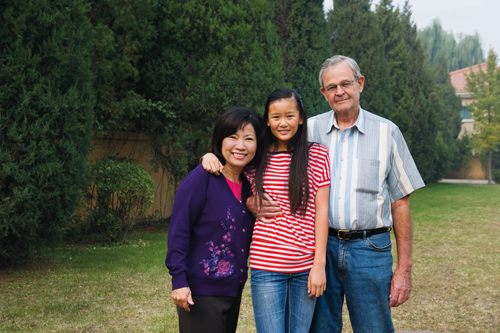Growing up in the United States during the 1950s, Michael Killfoil recalls: “My father worked, my mother worked. There was no stay-at-home dad. There was no stay-at-home mom. There was a mom who ran the house like a drill sergeant, and the dad never got involved in any of it.”
That concept of fatherhood was redefined when Killfoil himself, now 68, became a stay-at-home dad four years ago. Statistics show he’s not alone. According to the 2007 US Census Bureau, the US has about 159,000 stay-at-home dads, a number that almost tripled from a decade before. That number excludes single fathers, ones who work part-time, and those with children over 15.
When Killfoil and his wife Chinchie Chao Killfoil, age 54, adopted a 6-month-old baby from China in 1999, they were both working for the Internal Revenue Service in Houston, Texas. Hoping that their baby daughter Kelly would pick up some Chinese, they often left her with her Taiwanese grandparents. When they relocated to San Francisco and then Washington D.C., Kelly’s Chinese level did not improve. By then, Killfoil had already stopped doing full-time work in favor of tax consultation. When the IRS opened China’s first Tax Attaché office in Beijing, the couple jumped at the chance to have Kelly experience her birth country firsthand. When his wife got the job in Beijing, Killfoil retired completely to look after Kelly.
Debunking Common Myths
The phenomenon of stay-at-home dads is nothing new. One of the most important factors for this shift is the increase of women in high-paying jobs. In China, where attitudes about gender roles tend to remain more conservative, stay-at-home dads often attract more attention. One of the biggest misconceptions about them is “that we don’t know what we’re doing,” notes 44-year-old father, Trevor Marshallsea.
Four years ago, Marshallsea quit his job as the chief cricket writer for The Sydney Morning Herald to become a stay-at-home dad. He became the primary caregiver of his two daughters (Lani, age 6, and Evie, age 4) for practical reasons. His wife Stephanie Teoh is currently a family physician and child specialist at the Beijing International SOS Clinic. As a doctor, Teoh’s job seemed more mobile, so it made sense for her to find work in another country while Marshallsea stayed at home with the kids.
Having worked as a journalist since the age of 17, Marshallsea welcomed the chance to spend time at home. Since living in Beijing, Marshallsea does find that locals are perplexed by a wife working instead of a husband. A common misconception about stay-at-home dads is that they are unemployed or between jobs.
When one of Marshallsea’s daughters falls down in the compound yard, it is not uncommon for a swarm of ayis to swoop down on her out of concern. He feels that they are sometimes puzzled by his more laid-back parenting style.
“Some people might say or think, ‘How would a bloke know how to do this?’ or ‘It’s not a guy’s job.’ They probably think we’re like a fish out of water, but at the end of the day, it’s not rocket science.”
In general though, his experience in China has been a very positive one and if anything, he finds that strangers give him too much praise for being a full-time dad.
“We always get pats on the back for doing the mundane. I was feeding my girl a bottle of milk one day and this man passes saying ‘Oh, good on ya! You’re doing a great job!’ Whereas women who stay at home have to put their careers on the shelf. If they’re feeding their kid a bottle, no one says ‘You’re a great mother!'”
 Redefining the Roles
Redefining the Roles
Thirty-one-year-old Nils Brøgger Jakobsen feels that resources for stay-at-home parents in Beijing lean more towards mothers. Although he has always felt included in online groups like Beijing Mamas, he wishes their names would represent a wider range of parents.
When filling out a form, he explains, “It might say ‘mama’s name,’ but actually, what is relevant for me is to put in my name. [In English,] you have maternity leave and paternity leave, which is bad because it separates the genders. In Denmark, it would be called parent’s leave.”
Currently on “parent’s leave,” Jakobsen plans to return to his job at the international development organization ActionAid in Denmark. He moved to Beijing in August with his girlfriend Anja Bollerup-Jensen, age 29, and their 10-month-old son Birk. Bollerup-Jensen is currently doing a four-month internship with the Danish Cultural Institute as part of her master’s degree in Chinese and Global Studies.
Like Marshallsea, Jakobsen isn’t fazed by any setbacks that he has encountered in Beijing.
“I’ve been very welcome,” he says. “[They] call it ‘Mama’s Club,’ but when I say, ‘Can daddies come?’ they’re like, ‘Yeah! Please come.'”
For dads like Killfoil, he sees being a stay-at-home dad as an opportunity to challenge gender stereotypes from the ground up – starting with his daughter. He says, “I think [my daughter’s]vision of a role model is [that]the husband stays at home and takes care of everything. When she grows up and has a husband, I think he’s in trouble.”
The Dad Network
These three expat dads agree that a strong support network is one of the key elements to being a well-adjusted stay-at-home parent. “Everyone needs help,” says Marshallsea.
The difficulty, however, lies in finding these fellow dads in Beijing.
“Since I’ve been here, I’ve met two in three years,” states Killfoil.
And although Jakobsen enjoys spending time with mothers (and grandmothers) from his compound, he often misses the “guys” back home. “We were a bunch of friends who had kids at the same time. It would be so great for me if I could hang out with them. But this is also a great opportunity for me to be in a different culture and see things from a different point of view.”
Yet for Marshallsea, seeking out other stay-at-home dads is not a priority.
 He says, “There was one other last year [in my compound]. All the stay-at-home moms that I hang out with were falling over themselves to talk. ‘There’s another stay-at-home dad, you’ve got to meet him!’ It was the-only-other-panda-in-the-zoo kind of thing.”
He says, “There was one other last year [in my compound]. All the stay-at-home moms that I hang out with were falling over themselves to talk. ‘There’s another stay-at-home dad, you’ve got to meet him!’ It was the-only-other-panda-in-the-zoo kind of thing.”
Marshallsea feels there’s no need to confine himself to just befriending other dads when the Beijing expat community alone is so tight-knit and supportive.
In the end, Killfoil shares his sentiment: “The thing of it is, you could have two stay-at-home dads who have totally different backgrounds and wouldn’t get along at all. You have to have something else in common.”
 Busy Dads Means Happy Dads
Busy Dads Means Happy Dads
These full-time parents are always on the go, making the term “stay-at-home” a bit of a misnomer. To balance their duties as fathers, they make sure they have time to themselves. When his daughter is at school, Killfoil regularly plays tennis and explores the old villages surrounding the Shunyi area on his bicycle.
In Marshallsea’s case, it was his love of horse racing that kept him entertained during his first few months as a stay-at-home dad in Australia. Now that Lani and Evie are both in school, Marshallsea is gearing up for a number of writing projects, including a blog, called The Tiger Father – in which he documents his parenting experiences.
On most days, Jakobsen simply travels around town with baby Birk in tow. It gives him an opportunity to socialize with his son and see the city in a more intimate way. Though getting around with a stroller can be difficult, he finds that strangers are always willing to lend a hand.
“What [Beijing is] missing on technical facilities, it certainly [makes up for in]kindness of people,” Jakobsen feels. “Even though I’m sometimes on my own with Birk, I have 1.3 billion assistants who are eager to help.”
A common way for stay-at-home dads to get some breathing space is to hire an ayi. Marshallsea has a helper to babysit the girls and do some cleaning five afternoons a week. Killfoil’s ayi comes over about once a week to cook and practice Chinese with Kelly. While Jakobsen has no ayi, he said he would definitely consider hiring one if he planned on staying in China for the long-term.
Cherishing the Father-Child Bond
Despite the challenges of being a stay-at-home dad, the experience has been ultimately rewarding for all three dads.
Marshallsea finds, “I love when you see them developing and you see them learning new skills. Moments like that, when you’re just really proud and happy. It’s hard to get that kind of feeling from other sources, the feeling of pride you get from your kid.”
For a new parent like Jakobsen, being a stay-at-home dad allows him to witness Birk’s rapid development. He remarks, “Even if you eventually get to repeat the experience with a second child, it won’t be quite the same.”
Killfoil hopes that the bond he has with his daughter will allow her to grow into a more independent young woman. At 13 years old, Kelly plays soccer, helps her dad with renovation projects, and knows how to change a tire on a car.
As for her Chinese, it’s really good. “I pay her RMB 20 a week to be my translator,” he says.
RESOURCES
Dad Stays Home is an active global forum for stay-at-home dads. www.dadstayshome.com
Check out beijingkids online to meet other parents at Beijing playgroups and activities or at community networking events.
www.beijing-kids.com/events
Beijing Mamas, open to mothers and fathers, is members-only group for everything related to parenting in Beijing.
www.groups.yahoo.com/group/Beijing_Mamas
The Tiger Father is Trevor Marshallsea’s blog about his experiences as a stay-at-home dad.
www.thetigerfather.com
Rebel Dad is the blog of former at-home-dad Brian Reid, who now focuses on a broader set of fatherhood-related issues.
www.rebeldad.com
This article is excerpted from beijingkids October 2011 issue. View it in PDF form here or contact distribution@beijing-kids.com to find out where you can pick up your free copy.




